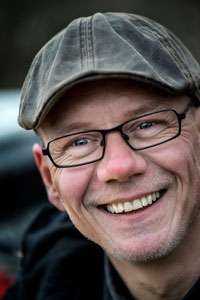Michael Kruse Jepsen is the man who plans and heads up everything to do with roads and gardens on DTU’s grounds. For example, it was his idea to have the gardeners swap their lawn-mowers for scythes in some campus areas last summer.
By Journalist Signe Gry Braad
Take a walk through the area around Building 417 on Lyngby Campus, and you will notice a vehicle parked there that would look more at home in the wilderness of Alaska than on the asphalted roads at DTU.
It is a ‘mature’ series 3 Land Rover, which has evidently been around the block a few times, and which looks unlikely to have any problems fording rivers or carrying hunting trophies home on its bonnet.
The powerful vehicle in question belongs to Michael Kruse Jepsen, Head of Campus Service Parks and Roads (CAS). It is 35 years old, and Michael Kruse Jepsen bought it from the Danish Armed Forces, where it had served as a radio vehicle up until 2005; so it is no stranger to hard work.
“It’s actually my seventh Land Rover,” he explains, as he welcomes DTUavisen into his office. He continues: “I don’t think I’ll ever tire of driving Land Rovers. Even if they can’t move faster than 80 km/h on the motorway.”
Michael Kruse Jepsen is wearing khaki trousers featuring an impressive number of pockets. His office walls are covered in detailed maps of DTU’s large outdoor areas, and in one corner there are three birds’ houses that are evidently waiting to be hung up somewhere.
He is obviously a true ‘outdoor man’.
Room for innovation
The job at DTU is different to the positions he held previously, and today he has no hesitation in admitting that he was less than impressed by what he saw when he came to DTU for his first job interview.
“Everything seemed to be very orderly and neatly manicured, without much room for innovation; which is what I actually said. Fortunately, the person conducting the interview was very interested in hearing what I thought could be done to shake up the outdoor areas—without adversely affecting the original desire for interplay between the architecture of the buildings and the green areas of the campus,” says Michael Kruse Jepsen.
He left his first interview with the sense of a workplace that was keen to honour its traditions, but open to new and different ways of doing things.
Two and a half years have now passed since his first day of work at DTU, and during that time one particular project has helped put the Office of Parks and Roads squarely in the spotlight.
Bring on the scythes
This past summer the grass beneath certain trees was not cut, and Lyngby Campus suddenly started looking like an open-air museum rather than an ultra-modern technical university, when the gardeners started to harvest with scythes in June.
The explanation for this is the implementation of the BiodiversiTest, project—an initiative that Michael Kruse Jepsen came up with and convinced the Campus Service management to try.
The purpose of the project is to develop new methods intended to boost natural diversity on campus— as regards both flora and fauna. At the same time, Michael is keen to prove that this kind of ‘nature management’ can make a positive contribution to the bottom line. Which is where the scythes come in:
“A scythe is actually an excellent tool if you are looking to establish more variation in the undergrowth,” explains Michael Kruse Jepsen with a fair degree of conviction.
Green roofs
The first part of the BiodiversiTest project has now been concluded, and among the findings is evidence that a more varied range of plants has grown up in the areas harvested with scythes. Michael Kruse Jepsen hopes that he will be allowed to continue working with some of the principles. And perhaps even involve some of the students.
“For instance, it might be fun to get some of the students to help us utilize the numerous flat roofs at DTU. We could set up small allotments or run experiments with ‘green roofs’, which really help to ease the load after heavy rainfalls.”
Another of his ideas, which is likely to be implemented in the near future, is to introduce livestock to Ballerup Campus, and to an area of common land on Risø Campus.
“They would eliminate the need to mow the grass, and it’s pleasant for students and staff alike to be around animals,” says Michael Kruse Jepsen, who has ten free range chickens and a border collie to take care of at home.
Portrait in DTUavisen no. 1, January 2015.

Michael Kruse Jepsen (born in 1966) lives just outside Hillerød, close to the countryside. Father of two teenage daughters who live in Copenhagen. Keen hunter and nature photographer.
- 2012: Head of Section at Parks and Roads, Campus Service (CAS)
- 2007–2012: Operations Manager for the Parks and Roads Department, Municipality of Vordingborg
- 2004–2006: Barracks Administrator, Skrydstrup Air Base
- 2002–2003: Parks and Roads Engineer, Municipality of Gram
- 2004–2006: Forest Ranger and Grounds Administrator, Skrydstrup Air Base
- 2000: Graduated with a degree in Forestry and Landscape Engineering